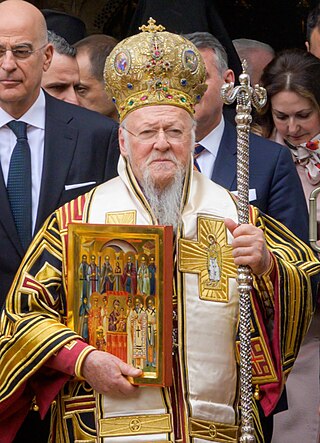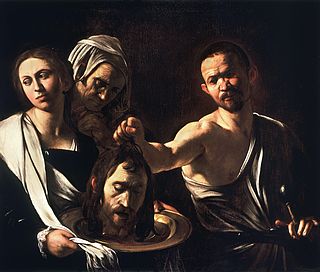Related Research Articles

The Eastern Orthodox Church, officially the Orthodox Catholic Church, and also called the Greek Orthodox Church or simply the Orthodox Church, is the second-largest Christian church, with approximately 230 million baptised members. It operates as a communion of autocephalous churches, each governed by its bishops via local synods. The church has no central doctrinal or governmental authority analogous to the head of the Catholic Church. Nevertheless, the Ecumenical Patriarch of Constantinople is recognised by them as primus inter pares, a title formerly given to the patriarch of Rome. As one of the oldest surviving religious institutions in the world, the Eastern Orthodox Church has played an especially prominent role in the history and culture of Eastern and Southeastern Europe.

An icon is a religious work of art, most commonly a painting, in the cultures of the Eastern Orthodox, Oriental Orthodox, and Catholic churches. The most common subjects include Jesus, Mary, saints, and angels. Although especially associated with portrait-style images concentrating on one or two main figures, the term also covers most of the religious images in a variety of artistic media produced by Eastern Christianity, including narrative scenes, usually from the Bible or the lives of saints.

John Chrysostom was an important Early Church Father who served as Archbishop of Constantinople. He is known for his preaching and public speaking, his denunciation of abuse of authority by both ecclesiastical and political leaders, his Divine Liturgy of Saint John Chrysostom, and his ascetic sensibilities. The epithet Χρυσόστομος means "golden-mouthed" in Greek and denotes his celebrated eloquence. Chrysostom was among the most prolific authors in the early Christian Church.

Pope Agatho served as the bishop of Rome from 27 June 678 until his death. He heard the appeal of Wilfrid of York, who had been displaced from his see by the division of the archdiocese ordered by Theodore of Canterbury. During Agatho's tenure, the Sixth Ecumenical Council was convened to deal with monothelitism. He is venerated as a saint by both the Catholic and Eastern Orthodox churches. He is said to have been the longest lived Pope ever.

The Russian Orthodox Church, alternatively legally known as the Moscow Patriarchate, is an autocephalous Eastern Orthodox Christian church. It has 194 dioceses inside Russia. The primate of the ROC is the Patriarch of Moscow and all Rus'.

The ecumenical patriarch of Constantinople is the archbishop of Constantinople and primus inter pares among the heads of the several autocephalous churches that compose the Eastern Orthodox Church. The ecumenical patriarch is regarded as the representative and spiritual leader of the Eastern Orthodox Christians worldwide. The term ecumenical in the title is a historical reference to the Ecumene, a Greek designation for the civilised world, i.e. the Roman Empire, and it stems from Canon 28 of the Council of Chalcedon.

Bartholomew is the 270th Archbishop of Constantinople, since 2 November 1991. In accordance with his title, he is regarded as the primus inter pares in the Eastern Orthodox Church, and as a spiritual leader of the Eastern Orthodox Christians worldwide.

The Ecumenical Patriarchate of Constantinople is one of the fifteen to seventeen autocephalous churches that together compose the Eastern Orthodox Church. It is headed by the Ecumenical Patriarch of Constantinople.

Doctor of the Church, also referred to as Doctor of the Universal Church, is a title given by the Catholic Church to saints recognized as having made a significant contribution to theology or doctrine through their research, study, or writing.

The Russian Orthodox Diocese of Sourozh is a diocese of the Russian Orthodox Church (ROC), covering the islands of Great Britain and Ireland. Since 28 December 2018, the Diocese of Sourozh is part of the Patriarchal Exarchate in Western Europe.

The Ukrainian Orthodox Church (UOC), commonly referred to by the exonym Ukrainian Orthodox Church of the Moscow Patriarchate (UOC-MP), is an Eastern Orthodox church in Ukraine.
Demetrios I, also Dimitrios I or Demetrius I, born Demetrios Papadopoulos, was the 269th Ecumenical Patriarch of Constantinople from July 16, 1972, to October 2, 1991, serving as the spiritual leader of 300 million Eastern Orthodox Christians. Before his election as patriarch, he served as the metropolitan bishop of Imvros. He was born in Istanbul in modern-day Turkey, then known as Constantinopole, where he also died.

The beheading of John the Baptist, also known as the decollation of Saint John the Baptist or the beheading of the Forerunner, is a biblical event commemorated as a holy day by various Christian churches. According to the New Testament, Herod Antipas, ruler of Galilee under the Roman Empire, had imprisoned John the Baptist because he had publicly reproved Herod for divorcing his first wife and unlawfully taking his sister-in-law as his second wife Herodias. He then ordered him to be killed by beheading.
Eastern Orthodoxy in the Philippines, also known collectively as the Philippine Orthodox Church, refers to the Eastern Orthodox presence in the Philippines as a whole.

Andrew the Apostle, also called Saint Andrew, was an apostle of Jesus. According to the New Testament, he was a fisherman and one of the Twelve Apostles chosen by Jesus. The title First-Called stems from the Gospel of John, where Andrew, initially a disciple of John the Baptist, follows Jesus and, recognizing him as the Messiah, introduces his brother Simon Peter to him.
Eastern Orthodoxy in Guatemala refers to adherents, communities and organizations of Eastern Orthodox Christianity in Guatemala. Many of the Eastern Orthodox Christians in Guatemala are ethnic Mayas. Although the dominant religion in Guatemala is historically Roman Catholicism, in recent decades other Christian denominations have gained adherents there. Eastern Orthodox Christianity in particular has been growing rapidly, as a number of schismatic Catholic groups have expressed their desire to become Eastern Orthodox and have been received under the jurisdiction of Eastern Orthodox hierarchs. Currently, there are two distinct Eastern Orthodox communities in Guatemala, the Antiochian and the Constantinopolitan.
On 15 October 2018, the Russian Orthodox Church broke the communion with the Ecumenical Patriarchate because of a dispute concerning the canonical jurisdiction over Ukraine. This led to the 2018 Moscow–Constantinople schism. Numerous Orthodox churches took position concerning the dispute over the canonical jurisdiction over Ukraine, whether before or after this schism.
The Patriarchal Exarchate in South-East Asia is an exarchate created by the Russian Orthodox Church (ROC) on 28 December 2018.
References
- 1 2 "www.synaxaristis - ΜΕΓΑΣ ΣΥΝΑΞΑΡΙΣΤΗΣ". www.synaxarion.gr. Retrieved 2024-08-16.
- ↑ Orthodox Holiness:: Around the Church Year With St John
- ↑ Saint of the Day, April 27 at SaintPatrickDC.org. Retrieved 2012-03-03.
- ↑ "POMOG - Protection of the Mother of God Church, Rochester NY". archive.ph. 2012-06-29. Retrieved 2024-08-16.